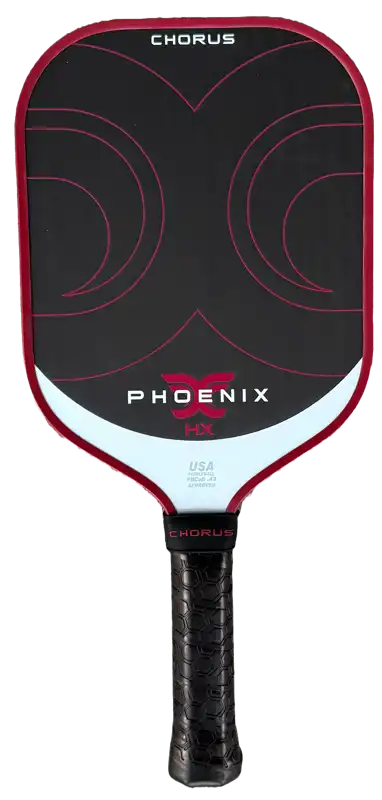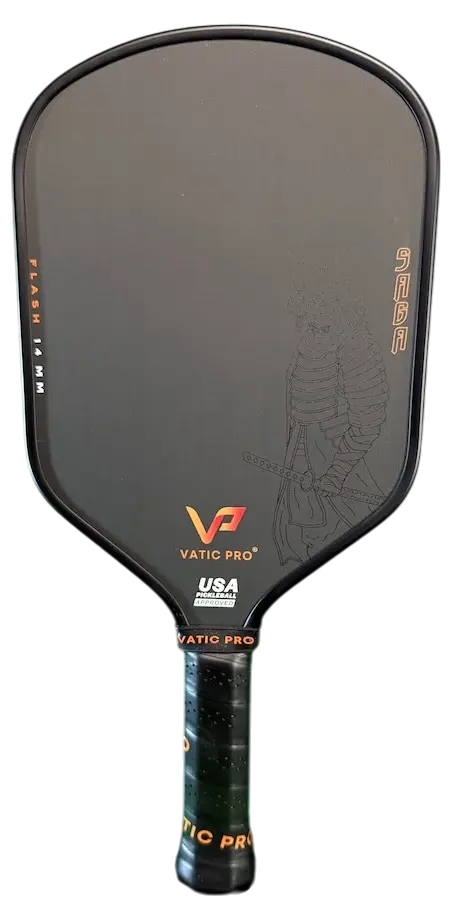TL;DR
- Powerful 58.4 MPH serves (74th percentile) and elite 38.3 MPH pop (89th percentile)
- Very stiff construction sacrifices feel for structured power transfer
- Limited 2093 RPM spin generation (good, not insane)
- Best for aggressive drivers who don't rely on heavy topspin
- Use code MPB for $10 off the $179.99 retail price
Intro
Is the Chorus Phoenix HX a power paddle that finally gets durable Gen 3 construction right, or just another stiff board that sacrifices feel for firepower? After weeks of testing, the answer depends entirely on what you value most in a paddle.
The Phoenix HX has a singular mission: maximum drive power and pop speed in a sub-8-ounce frame. It delivers 58.4 MPH serve speeds and 38.3 MPH punch volleys—elite numbers that put it in the 74th and 89th percentiles respectively. But that focus comes with real tradeoffs, particularly in spin generation and soft shot feel.
This is Chorus's first power paddle since the Fire series was discontinued, built for baseline drivers and counterpunchers who want a fast-swinging weapon that hits hard and pops with authority. The construction emphasizes structured energy return over tactile feedback, making it a specialized tool rather than a versatile all-around paddle.
Full disclosure: Chorus sent this paddle for review without conditions or influence on the outcome. I've also got discount code MPB that saves you $10 if you decide this paddle fits your game. What makes the Phoenix HX worth examining is how it manages to deliver serious power while maintaining stability and quick hand speed—a combination that's proven difficult to execute well in the Gen 3 category.
Tech Overview
The Phoenix HX centers around Chorus's "Singularity Core" system—a 10mm wide-cell polypropylene honeycomb designed for structured energy return and enhanced ball compression during contact.
The key differentiator is the foam suspension implementation. Rather than corner foam or floating fill like many Gen 3 paddles use, the Phoenix HX features a continuous 12mm foam wrap that extends through the throat. This includes a 5mm channel plus 7mm foam intrusion that bonds directly to the core structure, creating internal reinforcement rather than just empty space filler.
The face construction uses a soft carbon, fiberglass, soft carbon layup—essentially a CFC-style stack that provides more firmness than raw carbon while maintaining structural integrity under stress. This approach echoes the feel of Chorus's original Fire series but with improved construction quality and long-term durability.
Handle upgrades include polyurethane pallets instead of EVA foam for increased rigidity, plus a tall rubber throat ring that improves overgrip coverage while adding subtle vibration dampening. X-ray analysis revealed some inconsistencies in cell geometry near the top third of the paddle—manufacturing anomalies that Chorus has since addressed in their quality control process with updated production standards.
This construction places the Phoenix HX firmly in the Gen 3 category while providing more backbone than typical foam-core builds. It's essentially a disciplined version of the Fire series—same energy transfer principles with better structural foundation.
Specs
The Phoenix HX measures 16.125 by 7.75 inches in a true hybrid shape with a 5.5-inch handle and 4.25-inch grip circumference. Core thickness is standard 14mm throughout.
Lab-tested metrics reveal its performance character: 7.93 ounces static weight, 109.2 swing weight, 6.65 twist weight, and a 24cm balance point. These numbers translate to a paddle that swings quickly through the air while maintaining stability during off-center contact.
The performance data tells the complete story. Serve speed reached 58.4 MPH, ranking in the 74th percentile for power generation. Punch volley speed measured 38.3 MPH—89th percentile performance that indicates elite pop capability. However, spin generation measured only 2093 RPM, placing it in the 15th percentile and well below average for shot shaping ability.
The combined Firepower Score of 81 confirms this as a power-focused paddle. In practical terms, you get a quick-swinging implement that generates serious pace on full strokes and explosive pop during exchanges, but minimal assistance with topspin or ball manipulation. The specifications suit players who prefer to generate their own spin and control rather than relying on paddle characteristics to shape shots.
Playtest
First contact reveals the Phoenix HX's uncompromising character—this paddle is notably stiff with minimal dwell time and firm face response. Players familiar with the Vatic Flash or original Fire series will recognize the immediate, structured energy return that prioritizes power transfer over tactile feedback.
Drive performance justifies the 81 Firepower Score completely. Full strokes generate serious pace with that 58.4 MPH capability, whether you're driving third shots or countering floaters from the baseline. The 109.2 swing weight provides enough mass for heavy hitting while maintaining quick enough hand speed for aggressive exchanges.
Pop performance during volleys and counters is genuinely impressive. The 89th percentile punch volley speed translates to explosive energy return when you time contact properly and find the sweet spot. It's not trampoline-like bounce, but rather immediate, aggressive response that rewards compact swings and proper technique.
The limitations become apparent during soft game situations. Reset shots and touch placements feel disconnected due to minimal dwell time and firm face characteristics. This paddle demands aggressive intent rather than guided finesse. You can execute soft shots, but the feedback isn't forgiving for players who rely on feel during delicate placements.
Spin generation struggles at 2093 RPM...it's not bad...but it's not top-tier for shot shaping. The peel-ply texture doesn't grip aggressively, and the paddle's stiffness prevents effective ball shaping through contact. Heavy topspin drives and shaped third shots require more technique and timing than spin-friendly alternatives would demand.
Stability remains excellent throughout testing. The 6.65 twist weight keeps off-center hits playable, and the 24cm balance point feels composed during fast exchanges. No flutter or unwanted flex during aggressive swings, and the foam suspension system effectively dampens vibration without compromising energy transfer.

- Control
Best for strategic players who favor precision and placement over power, excelling in slow play and careful ball manipulation. - All-Court
Designed for versatile players who want the best of both worlds. These paddles balance control, power, and speed, adaptable to various playing styles. - Power
Ideal for aggressive players (aka, "bangers") who prioritize fast, powerful gameplay, sacrificing some control and sweet spot size for maximum force.


Chorus
Phoenix HX 14mm
Power
$
179.99
choruspickleball.com
90-Days
...
Recommendations
The Phoenix HX serves a specific subset of players exceptionally well. If you prioritize drive power and pop speed over spin generation and soft feel, this paddle delivers measurable performance advantages. Counterpunchers who need faster hands during exchanges will appreciate that elite 89th percentile pop capability.
Players who generate their own pace and control through technique rather than paddle assistance will connect with the direct, unfiltered feedback. The clean energy return rewards proper mechanics while punishing poor timing—characteristics that appeal to technical players who understand their stroke production.
Avoid this paddle if your game depends on spin generation, soft resets, or maximum dwell time for guided shot placement. Touch-first players who value tactile feedback during drops and dinks will find the rigid response frustrating rather than helpful.
This is also not ideal for players seeking trampoline-effect power. The Phoenix HX requires you to swing through the ball to access its capabilities—it's earned power rather than assisted power. Beginners will likely find the firm response less forgiving during the learning curve.
Experience level recommendation: intermediate to advanced players who understand their game requirements and specifically want power over finesse. The paddle rewards technical competence while exposing mechanical flaws.
Price and Value
The Phoenix HX retails for $179.99, or $169.99 with discount code MPB. This positions it in the accessible Gen 3 price tier, making it more budget-friendly than many competing hybrid constructions.
For power-focused players seeking a paddle that drives hard and pops fast, the value proposition is solid. The foam suspension system, upgraded handle components, and documented performance metrics justify the price point within its category.
The construction quality improvements over previous Chorus models, combined with measurable performance data, support the pricing for players who match the paddle's power-focused design intent.
Conclusion
The Phoenix HX 14mm delivers exactly what it promises: rigid, fast power in a manageable weight package. It's a paddle that knows its identity—a tool for baseline drivers who want to hit hard and counter with authority, accepting below average spin capability as a necessary tradeoff.
For players seeking a Gen 3 build that generates serious pace without feeling flimsy or uncontrolled, the Phoenix HX provides measurable performance advantages. The 74th percentile serve speed and 89th percentile pop speak to genuine power capability, while the stability metrics ensure consistent performance during aggressive play.
If you've got questions about how the Phoenix HX compares to other paddles you're considering, or want specific details about any aspect of its performance, drop them in the comments below. You can pick one up with code MPB to save $10 off retail.
For more detailed paddle breakdowns and performance analysis, subscribe to the newsletter and follow along on YouTube for the latest reviews and testing updates.
Discount Code
Similar Paddles



%20(1100%20x%20220%20px)%20(1000%20x%20300%20px)%20(1).webp)



















